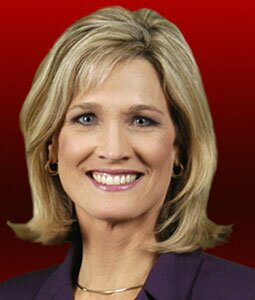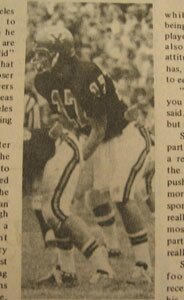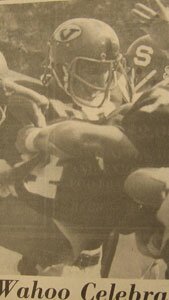NEWS- Politics unusual- Small players had big impact
Peggy Fox and Ken Shelton are no shrinking violets. Fox's face is familiar to Washingtonians as an Emmy-winning reporter for CBS affiliate WUSA, and Shelton found the spotlight via the end zone as a star tight end for the UVA football team in the mid-'70s.
Even so, in any other year they probably wouldn't have become national headline fodder. But in a political campaign as bizarre as this year's between Senator George Allen and Senator-elect Jim Webb, anything could– and often did– happen. From the now-legendary "macaca" remark to an Omni Hotel scuffle, the only things more unlikely than the news were the people making it.
On September 18, the day of the third debate between Allen and Webb, such attention was the last thing Fox expected when, as a debate panelist, she asked Allen about his Jewish heritage.
"It was a question that had been out there," she says. "He had just mentioned that his grandfather had been imprisoned by the Nazis, so I thought it was a germane time to ask about it. I was just trying to learn more about this candidate."
As it turned out, it wasn't Fox's question that made her news– it was Allen's reaction to it.
After some booing from Allen supporters, the senator told Fox, "You know what the first freedom in our country was? Freedom of religion. Why is that relevant? My religion, Jim's religion, or the religious beliefs of anyone out here?"
Allen then explained that his mother was, "Italian with a little Spanish blood in her, and I was raised and she was raised, as far as I know, as a Christian."
Fox tried to explain why she was asking the question: "Honesty, that's all."
"Oh that's just all? That's just all?" Allen retorted before stressing, "One of those foundational values is freedom of religion and not making aspersions because of their religious beliefs."
"I was shocked," says Fox. "It was a character question, and it had nothing to do with whether anyone should care. The allegation had been made that he might be hiding some of his heritage. I wanted to know why."
What proved equally shocking for Fox was Allen's revelation the next day that his mother had told him– a month earlier– that as a girl in Tunisia, she had been raised Jewish, a fact she'd concealed upon her arrival in the United States because of her father's experience with the Nazis.
"I don't know why he wasn't honest in the debate," Fox says, "but the fact that he was honest about it the next day was a good thing. I think voters are better served to know who their candidates are, and I think it's fair for me to ask if he has that background. It makes him more interesting."
Disclosure is precisely what thrust Ken Shelton onto the national political stage when, on September 21, Salon reporter Michael Scherer called the Hendersonville, North Carolina radiologist with questions about his experiences as a UVA football teammate of Allen's. For months, Shelton says, he had had a feeling this day would come.
"I'd read in the New York Times that George Allen was in New Hampshire testing the waters for a 2008 presidential bid," he says. "When I saw that I said, 'This can't happen,' and I knew I needed to start writing down a list of these memories."
As Scherer reported three days later, those memories included Allen repeatedly using the "n-word" to describe African Americans, Allen nicknaming Shelton "Wizard" because he shared the last name of Ku Klux Klan founder Robert Shelton, and Allen stuffing a severed deer's head into an African American family's mailbox on a hunting trip with Shelton and their teammate Billy Lanahan (who died earlier this year).
"I knew I had to clear my conscience," says Shelton, who has actively supported both Republican and Democratic candidates for public office in the past. "I always thought someone else would come forward with similar stories and I wouldn't have to come forward with these memories that are truly embarrassing to me. I always thought that George Allen would end up being a redneck lawyer in a small town somewhere and that I'd never have to come forward."
Though Shelton has not seen Allen in 30 years, he says he felt confident his teammate had not changed much after seeing his treatment of Webb volunteer S.R. Sidarth (who did not return requests to be interviewed for this piece) in the infamous "macaca" video.
"He had this condescension in tone that brought back memories of how he treated other students at Virginia," he says. "He was against everybody who was below him, and he always put himself above others. The aura around him suddenly dissolved, and people could see that he's a bully."
Allen has denied all of Shelton's allegations.
Both Fox and Shelton say they have received more than their share of angry letters and e-mails in the wake of their moments in the spotlight, but both stand by their actions.
"Secrets can be horrible things to keep," says Fox. "Most people aren't afraid of their heritage– and now that it's out in the open, Senator Allen and his mother don't have to keep this a secret anymore."
"I should have been more honest about this 26 years ago when [Allen] ran for office the first time," says Shelton. "But the truth is absolute, and now that I've been truthful about this, it's set me free."

Peggy Fox was booed by Allen supporters for asking the senator about his Jewish heritage at a September 18 debate.
COURTESY OF WUSA-TV

Ken Shelton told a Salon reporter several stories about Allen's allegedly racist attitudes.
PHOTO BY JONATHAN WELCH


George Allen and Ken Shelton (center) were teammates on the UVA football team, as seen in archival copies of the Cavalier Daily.
PHOTOS BY LINDSAY BARNES
#